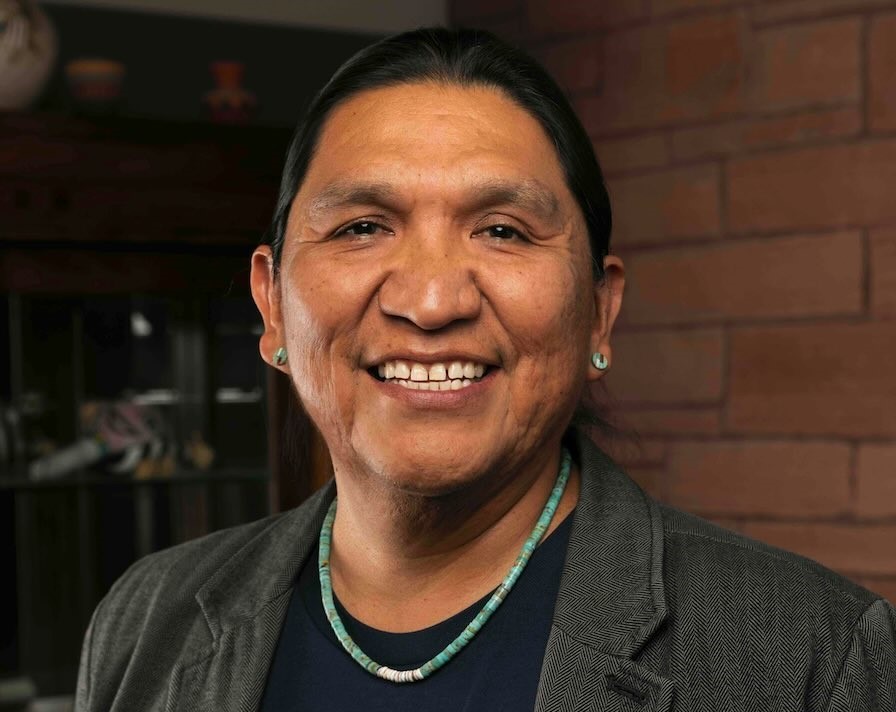“I want to see more Native Americans with careers in teaching.”
Native American students should not feel that they live in an “either or” world, says Northern Arizona University educator Darold Joseph, Ph.D. Instead, he believes they can thrive by drawing from the best of two realms.
“Native Americans face the challenge of using more modernity and more technology to sustain who we are,” he said. “Students can learn to meet state and federal educational requirements while still retaining and using their culture.”
Joseph is the director of the Institute for Native Education at NAU and also an associate professor of special education. He works with K-12 educators to develop community assets that support Native youth. He explains that traditional learning models can be overwhelming unless connected to cultural understanding.
“Native students may be asked to write a five-paragraph essay with a beginning, a middle and an end. They may find this daunting, but if the Hopi think of the Butterfly Dance, they know it has a beginning, a middle and an end.”
With its goal of “Elevating Excellence,” NAU is working to support tribal communities in higher education by creating an environment where Native young people feel a sense of place. The university, he noted, has increased the number of Native faculty and students while providing professional development for Native teachers. “We’re not there yet, but we’re moving in that direction,” he said.
His research and teaching are shaped by his own experience, growing up Hopi in the village of Moenkopi and attending Tuba City High School. He went on to pursue and complete his bachelor’s and master’s degrees at NAU. In 2019, he earned a doctorate in special education at the University of Arizona and has worked for NAU since 2013.
His research is focused on the intersection of disability with horticultural differences that inform educational inequities for American Indian and Alaska Native youth. His work aims to advance opportunities for indigenous youth with and without disabilities to persist in education, health and wellness, and cultural well-being.
He has found that students on the reservation are grounded in their ceremonies, chopping wood and going to the fields to work. “I learned that student success depends on both realms together. There wasn’t much of that in special education, so I wanted to do the research. I learned that if we do that in K-12, that if we combine Native culture with Western education, students will be more successful. That’s why I do what I do at NAU. Students need a sense of belonging and remember their families and their clans in order to make sense of the Western education.”
Joseph’s parents spent their careers in education. His father, Harold Joseph, Ph.D., earned a doctoral degree in business and served as director of Dine College in Tuba City before retiring. His mother, Charlene Joseph, taught special education. Darold began his journey in higher education by taking a business course but found that wasn’t for him. He then started teaching special education where he found his calling.
“The best part of my job is the students,” he said. “I represent not only Hopi but all tribes because there aren’t many Native college professors, so I’m proud of that. I’m glad to be a role model, but the challenge is to get more Native teachers, especially during this time of teacher shortages. I want to see more Native Americans with careers in teaching.”
Currently, he is the principal investigator on breast and cervical cancer screening for Native American women with disabilities. He also is the co-principal investigator on the mental health of youth in the Hopi community. He is working in partnership with Hopi Behavioral Health on mobile services to support Hopi youth.
Favorite Pastime
Spending time with my five children and two grandchildren. I also enjoy going to the field. I find solace in going home and being connected to my family and using the Hopi language.
Where I Hope to Visit
I would like to return to the pyramids in Mexico City because we have stories connected to there. Machu Picchu in Peru would be great to see.
Guilty Pleasure
Sitting at home watching Netflix with my wife, Alisse.
Best Part of the Day
Morning because you can see the opportunities for the good things to happen.
My Superpower
Building communities. FBN
Courtesy Photo: NAU Director of the Institute for Native Education and Associate Professor Darold Joseph, Ph.D., strives to attract more Native students and teachers to higher education.


